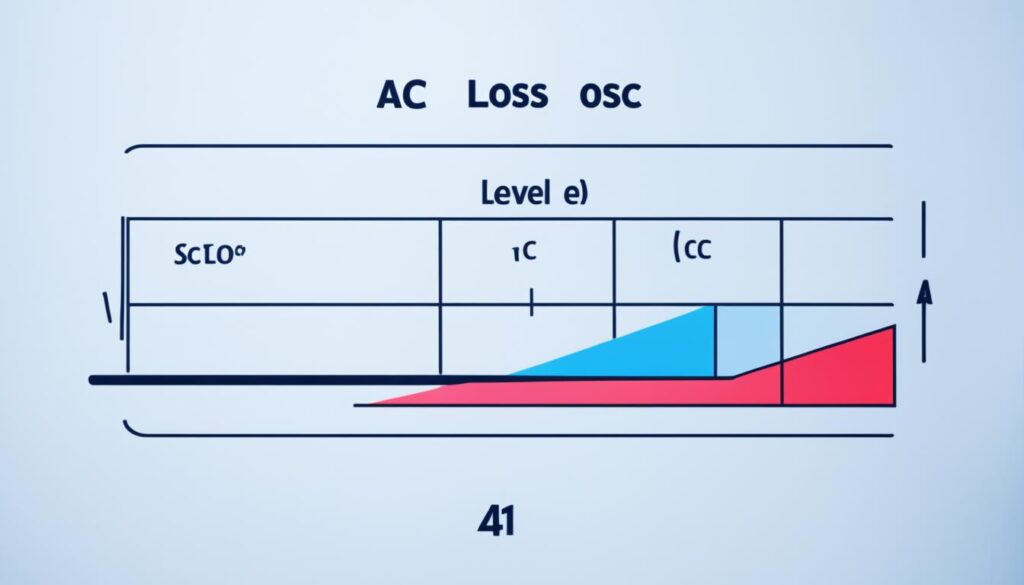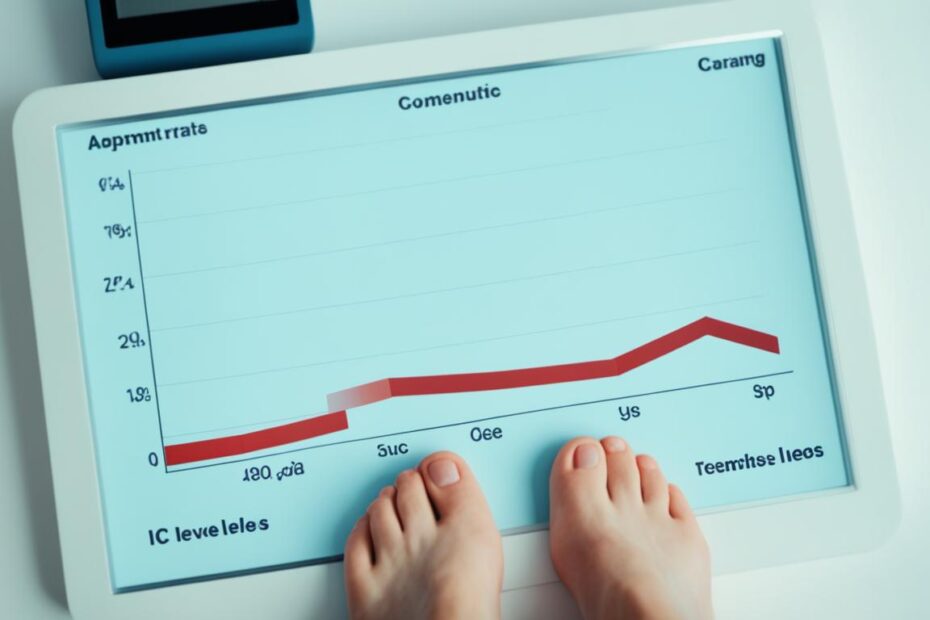Many with type 2 diabetes wonder, “Will losing weight lower A1c?” The answer is yes. But let’s unpack this further. This will help us see why weight loss is key for managing blood sugar and diabetes.
Losing weight means more than smaller clothes. It’s a great way to fight diabetes. Studies say losing weight can really help. It makes your A1c, which shows average blood sugar, get better. Just losing 5-10% of your body weight can make your A1c drop by 0.5 points.
Why does a lower A1c matter? It’s not just about lowering a number. It’s about staying healthy. Lowering your A1c helps protect your eyes, kidneys, heart, and nerves. It’s an important step to a healthy life without just relying on drugs.
If you’re eager to manage your diabetes better, keep reading. We’ll show you how losing weight can greatly help. It’s good for your diabetes and your health overall.
Understanding A1c and Its Importance in Diabetes Management
The A1c test is very important in diabetes care. This test shows how well you’ve controlled your blood sugar over time. So, understanding A1c is key for people with diabetes.
What is A1c and how is it measured?
The A1c test tells us how much sugar is on our red blood cells. It shows the average blood sugar over the last two to three months. Just a blood draw is needed for this.

Target A1c levels for diabetes control
The best A1c level for most adults with diabetes is under 7%. Yet, everyone’s aim might be different. An A1c of 6.5% or more means you have diabetes. Regular tests help keep track of your blood sugar.
The relationship between A1c and blood sugar levels
A1c is all about our average blood sugar from months back. It doesn’t change quickly. Checking A1c often shows how our daily choices affect blood sugar. This helps us make better diabetes choices.
- A1c of 5.7% to 6.4%: Prediabetes
- A1c of 6.5% or higher: Diabetes
- A1c below 5.7%: Normal
Knowing about A1c is empowering for managing diabetes. It’s a top tool in taking care of our blood sugar and our health.
The Connection Between Weight and A1c Levels

Weight is key in handling A1c levels. Too much weight may cause insulin resistance. This makes using insulin well tough, raising blood sugar and A1c levels.
Losing weight can drop A1c levels. Just a bit of weight loss is a big help. Losing 5-10% of your weight ups your chance to lower A1c by 0.5 points. This is great news for anyone weighing 175 pounds. They only need to lose 9-18 pounds!
But, weight loss helps with more than A1c. Studies show this. Lowering A1c one point cuts eye disease risk by 75%, kidney disease by 50%, and heart attacks by 57%. So, keeping a healthy weight is super important for fighting diabetes.
- Losing 5-10% of body weight triples the chance of lowering A1c by 0.5
- A 9-18 pound weight loss for a 175-pound person can significantly improve health
- Lowering A1c by 1 point reduces eye disease risk by 75% and kidney disease risk by 50%
You don’t have to lose a lot of weight for it to matter. Making small changes in what you eat and how you exercise is a great start. These can really help your blood sugar and health.
Will Losing Weight Lower A1c: Exploring the Evidence
Have you ever thought about losing weight to help with type 2 diabetes? Well, studies show that losing weight really does make a difference. Even a little weight loss can greatly lower your A1c levels. Let’s see how this works and how small changes matter a lot.
Research on Weight Loss and A1c Reduction
Recent studies bring good news for people with type 2 diabetes or prediabetes. Even losing just 5 to 10% of your body weight can make a big difference in your A1c levels. Those who manage this modest weight loss are much more likely to see their A1c drop by 0.5 points.
Impact of Modest Weight Loss
You don’t have to lose a lot of weight to see changes. Small weight losses can really impact your A1c levels. This is great for anyone who struggles to lose a lot of weight fast. Every pound you lose helps improve your health.
Long-term Benefits of Healthy Weight
Keeping a healthy weight in the long run is important to control A1c levels. It lowers the chance of diabetes issues and maintains your A1c at a good level. By making long-term changes to your lifestyle, you can stay healthier.
This shows that managing your weight is crucial for dealing with diabetes. If you have type 2 diabetes or prediabetes, weight loss is an essential step. Always remember, small changes can have a big impact on your health and A1c levels.
Effective Strategies for Lowering A1c Through Weight Loss
Combining diet and exercise helps lower A1c levels. It’s important to live healthily for better blood sugar control.
Start with portion control tools like measuring cups. This helps you not eat too much. Planning meals ahead stops high-carb, impulsive choices that can raise your blood sugar.
Try a Mediterranean diet. It’s low in bad fats and full of vegetables. It’s good for keeping A1c levels in check. Here’s how to begin:
- Fill half your plate with non-starchy vegetables
- Choose whole grains over refined carbohydrates
- Include lean proteins like fish and poultry
- Use olive oil as your primary fat source
Don’t forget about exercise. Mix cardio and strength training. It makes your body more sensitive to insulin. Aim for 30 minutes of exercise a day. Increase workout time slowly as you get stronger.
Consistency with healthy eating and exercise is key. Stick to these changes for better A1c control and health.
Nutrition Tips to Support Weight Loss and A1c Reduction
Making the right food choices helps a lot in reducing your A1c levels and weight. Here are some handy nutrition tips for better health.
Balancing carbohydrates for better blood sugar control
I watch my blood sugar by choosing the right carbs. I put lots of veggies on my plate, some lean protein, and a bit of whole grains. This mix lets me enjoy a range of foods and keeps my blood sugar steady.
Incorporating fiber-rich foods into your diet
Fiber is great for blood sugar and losing weight. I try to get 14 grams of fiber for every 1000 calories. I love foods high in fiber like beans, quinoa, berries, and nuts.
- Beans and lentils
- Whole grains like quinoa and oats
- Berries and apples
- Nuts and seeds
The role of portion control in managing A1c levels
Portion control is key for losing weight and controlling blood sugar. I measure my food to avoid eating too much and plan my meals every week. This strategy helps me stick to my health goals and keeps my A1c levels low. If you want more ways to lower your A1c, read this helpful guide on managing blood sugar.
Exercise and Physical Activity: Key Components in Lowering A1c
Exercise is super important for controlling blood sugar. It’s not only for losing weight. Being active helps a lot in managing your A1c levels too. After you work out, your blood sugar can stay low for a whole day. That’s amazing!
Working out with both cardio and lifting weights helps control diabetes. When we move, our muscles use sugar, making blood sugar after meals better. Doing this often helps drop A1c levels.
Here’s how exercise is great for you:
- Lowers blood glucose during and after activity
- Improves insulin sensitivity
- Helps maintain a healthy weight
- Reduces cardiovascular disease risk
Sometimes, exercise can make your blood sugar drop too much. This is more likely if you take insulin or certain drugs. Always check your sugar before you start, and have a snack just in case. Regular physical activity is vital in diabetes care. It helps lower A1c and makes you healthier.
Even small changes are important. Begin with short walks and build up your activity over time. Your body and A1c will improve. Keep it up!
Monitoring Progress: Tracking Weight Loss and A1c Improvements
Checking my weight loss and A1c levels is super important for managing diabetes well. Getting my A1c tested every few months tells me how I’m doing over time. It’s a big part of my health plan.
Measuring my blood sugar every day is crucial too. It shows me right away how my food and activity choices impact my sugar. This fast feedback keeps me inspired to keep up the good work. I feel more in charge of my health this way.
Improving my A1c takes time. The A1c test shows my average blood sugar from 2-3 months back, so changes take a while. But by regularly eating well, staying active, and following my meds, I see better A1c numbers. Each good choice gets me closer to my diabetes goals.
